Iran - Perzija
Page 2 of 5
Page 2 of 5 •  1, 2, 3, 4, 5
1, 2, 3, 4, 5 
 Re: Iran - Perzija
Re: Iran - Perzija
S ukidanjem sankcija je Iran došao do zraka i odmah nakon toga upao u blato rata u komšiluku.
Rat košta, a nema se novca za takva s*anja. Vjerske mule imaju jedan cilj a većina naroda savim drugi- jebe im se i za Irak i Siriju.
Rat košta, a nema se novca za takva s*anja. Vjerske mule imaju jedan cilj a većina naroda savim drugi- jebe im se i za Irak i Siriju.
Eroo- Posts : 79064
2016-07-22
 Re: Iran - Perzija
Re: Iran - Perzija
Pinochet wrote:gledam slike prosvjeda..
Ja vidim da je pola slika i snimki staro koliko i zadnji veliki prosvjedi kad je ubijena ona - Neda -
čak i nju prikazuju na snimkama
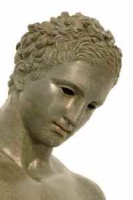
Yehudi- Posts : 14715
2014-04-20
 Re: Iran - Perzija
Re: Iran - Perzija
Iranci nemaju baš puno izbora...
Il vjerske mule i suverenitet, il 'demokracija' i američki protektorat...
Na njihovom bi mjestu izabrao pod 1/, pa i ako to znači spori internet...
Il vjerske mule i suverenitet, il 'demokracija' i američki protektorat...
Na njihovom bi mjestu izabrao pod 1/, pa i ako to znači spori internet...
_________________

T.- Posts : 17594
2014-04-14
Age : 83
 Re: Iran - Perzija
Re: Iran - Perzija
Nisam baš pratio jer sam mislio da će se smiriti no izgleda da ipak ne, 12 mrtvih
http://balkans.aljazeera.net/vijesti/iran-u-protestima-poginulo-12-osoba
http://balkans.aljazeera.net/vijesti/iran-u-protestima-poginulo-12-osoba

RayMabus- Posts : 184137
2014-04-11
 Re: Iran - Perzija
Re: Iran - Perzija
12 mrtvih ipak nije malo, kako god okreneš Iran može očekivati sankcije od demokratskog svijeta dakle EU sad htjela ne htjela mora uvesti dodatne i strožije sankcije

RayMabus- Posts : 184137
2014-04-11
 Re: Iran - Perzija
Re: Iran - Perzija
Šta je sa neredima? di je onaj Iranski HDZovac, alphaomega da nam da neku informaciju?

Guest- Guest
 Re: Iran - Perzija
Re: Iran - Perzija
Opet neko "proljeće" u režiji "demokratskih snaga".
Evo čak ih je izraelski ministar špijunaže podržao
Evo čak ih je izraelski ministar špijunaže podržao

""Mogu samo poželjeti uspjeh iranskom narodu u borbi za slobodu i demokraciju", kazao je ministar za obavještajna pitanja Israel Katz u intervjuu za vojni radio."
_________________
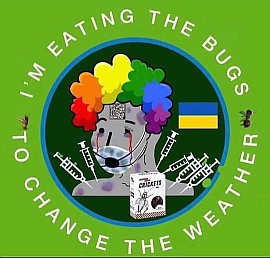

catabbath-

Posts : 12438
2015-08-21
 Re: Iran - Perzija
Re: Iran - Perzija
nevirujem da imaju išta ameri i židovi sa iranskim prosvjedima. obični iranci i umjereni, sve jedno nevole židove, ali jedina je razlika od ostalih Iranskih HDZovaca na vlasti ,da nisu zainteresirani za ratovanje itd.
isto tako nemoguće je da u Iranu se išta organizira iz vanka, država ima dobru obavještajnu službu i odličnu kontrolu, male su šanse da neki židov ili amer - rovari iz-unutra.. vjerojatno spontani prosvjedi običnih Iranaca protiv Iranskog HDZa koji pljačka državu
isto tako nemoguće je da u Iranu se išta organizira iz vanka, država ima dobru obavještajnu službu i odličnu kontrolu, male su šanse da neki židov ili amer - rovari iz-unutra.. vjerojatno spontani prosvjedi običnih Iranaca protiv Iranskog HDZa koji pljačka državu

Guest- Guest
 Re: Iran - Perzija
Re: Iran - Perzija
..na aparatima..konzultira one svoje iz iranskog ambasade...Pinochet wrote:Šta je sa neredima? di je onaj Iranski HDZovac, alphaomega da nam da neku informaciju?


Guest- Guest
 Re: Iran - Perzija
Re: Iran - Perzija
Pinochet wrote:nevirujem da imaju išta ameri i židovi sa iranskim prosvjedima.

catabbath-

Posts : 12438
2015-08-21

catabbath-

Posts : 12438
2015-08-21
 Re: Iran - Perzija
Re: Iran - Perzija
Iran ima jako podlu vanjsku politiku...zanima me sto 3000 iranskih obavjestajaca radi u svabiji??? 


Guest- Guest
 Re: Iran - Perzija
Re: Iran - Perzija
pismejker wrote:Iran ima jako podlu vanjsku politiku...zanima me sto 3000 iranskih obavjestajaca radi u svabiji???
Rado bi ih imao umisto Jandrokovića. Možda bi i arbitraža bolje prošla.

catabbath-

Posts : 12438
2015-08-21
 Re: Iran - Perzija
Re: Iran - Perzija
nelos narod,skloni promisljanju,i dopizdilo im da ih Mule trpaju u konflikte sa drugim silama,i koriste kao izgovor za svoju politiku..catabbath wrote:pismejker wrote:Iran ima jako podlu vanjsku politiku...zanima me sto 3000 iranskih obavjestajaca radi u svabiji???
Rado bi ih imao umisto Jandrokovića. Možda bi i arbitraža bolje prošla.
skloni su propitivanju svega,pa i vjere i politike,a to Mulama ne odgovara...
zanimljiv zakon...najjaca kubikaza motora,dopustena,jest 250 kubika...bila je neke godine jedna ekipa iz vinkovaca u Iranu,nes putopisno,i radili su materijal..ugl. ono idu mjestima prolaze,druze se sa ljudima i tako...
ocjena..nacija oke,vlast zivi uzas..


Guest- Guest
 Re: Iran - Perzija
Re: Iran - Perzija
Kaj te konkretno interesira, dečec?Pinochet wrote:Šta je sa neredima? di je onaj Iranski HDZovac, alphaomega da nam da neku informaciju?

_________________
I ask not for a lighter burden, but for broader shoulders.
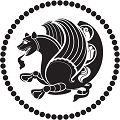
AlfaOmega- Posts : 10397
2015-09-11
 Re: Iran - Perzija
Re: Iran - Perzija
[size=68]Soon after the Shah of Iran was forced from power in 1979, a small group of the uprising’s young leaders suggested the creation of a national guard, tasked with preserving the new Islamic revolution and counterbalancing the country’s conventional military.
[size=16]Analysis 'We are on a tightrope': Trump poised to walk away from Iran nuclear deal[/size]
President unlikely to certify pact this week, triggering complex battle in Congress and Europe over ultimate fate of agreement
Read more
Ayatollah Khomenei, the charismatic cleric who soon became the country’s supreme leader, hesitated to call the members of the new force “guards”, fearing the word was too close to the French word widely used to refer to the ousted monarch’s elite personal force.
Instead he opted for sepah, a Persian word for soldiers with historical connotations, and the new force became known asthe sepah-e-pasdaran or “army of the guardians”.
Most foreign governments, however, refer to it as the Islamic revolutionary guard corps – a force that, 38 years later, has become a key player both inside Iran and across the region.
Reports that the US government is poised to designate the IRGC as a terrorist grouphave sparked jitters in Tehran, overshadowing Donald Trump’s expected plan to tear up the landmark nuclear deal.
Donald Trump’s demonisation of Iran is dishonest and dangerous
Michael Axworthy
Read more
The US accuses the IRGC of terror mainly because of its military support for Hezbollah and Hamas, organisations that the US and EU have both designated as terrorist groups. Trump has argued that Iran’s support for such groups violates the spirit of the nuclear deal.
Iranian officials say privately that Trump’s ability to unravel the nuclear deal is bound by the US Congress and the reaction of Washington’s allies in Europe. They warn, however, that a move against the IRGC would be a step too far and could even push the two countries towards open war.
Political leaders in Tehran are keen to show unity. A smiling IRGC commander, Mohammad Ali Jafari, was photographed earlier this week arm in arm with the foreign minister, Mohammad Javad Zarif, the architect of the nuclear deal.
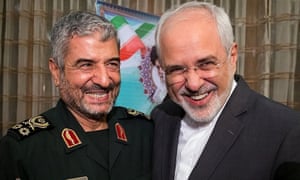
The IRGC commander, Mohammad Ali Jafari, and Iran’s foreign minister, Mohammad Javad Zarif. Photograph: Handout/Reuters
Jafari has said that US military bases in the region would be open to attack if his forces were designated a terrorist group. Zarif’s ministry has said that Tehran’s reaction would be “firm, decisive and crushing”. Even the country’s moderate president, Hassan Rouhani, who five months ago made a rare public criticism of the IRGC during his run for a second term, issued his full-throated support for the force, saying that it “has a place in people’s heart”.
Farideh Farhi, an academic who monitors Iranian affairs closely, said that designating the IRGC as a terrorist group would be unprecedented.
“The IRGC is a integral part of Iran’s military defence and has constitutional standing as such. The designation of military officers of another country as terrorist will be a first and will open the US military to reciprocal action,” she said.
Particularly at risk, Farhi said, would be US special forces operating in the Middle East.
The IRGC initially operated as a local force across Iran, but it expanded quickly after Saddam Hussein invaded Iran in 1980 and Khomeini allowed it to have its own ground, navy and air forces.
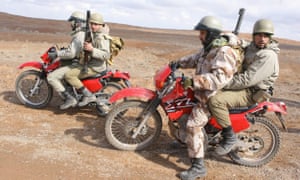
Revolutionary guards in wargames near Qom, south of Tehran. Photograph: AFP/Getty Images
It played a key role in Iran’s defence, particularly in the Strait of Hormuz, where it used small speedboats to stop oil tankers used by Hussein and his allies.
“Before the war the IRGC militiamen were nothing more than bodyguards to the clerics. Their performance in the war gave them a seat at the proverbial power table,” said Mehrzad Boroujerdi, a professor of political science at Syracuse University in the US.
Khomeini, however, remained wary of its growing force, writing an explicit command for it to stay away from politics into his will.
After succeding Khomeini in 1989, Ayatollah Ali Khamenei introduced a new dimension to the IRGC’s operational capacity by creating the Quds force, which is in charge of its overseas operations and has worked closely with Hezbollah in Lebanon and Hamas in Palestine.
Tehran has never concealed its backing for Hamas and Hezbollah, which it sees as legitimate political parties that have won elections legally, said Ali Alizadeh, a London-based political analyst.
Such activities have infuriated the US and Iran’s regional rivals, but the IRGC’s operations in Lebanon, Bosnia and Iraq – and more recently its involvement in propping up Syria’s Bashar al-Assad – have hugely endeared them to Khamenei.
The US also alleges that Iran has been behind a series of bombings in Iraq that has led to the death of US military personnel, accusations that Iranian officials say are not substantiated. A string of senior IRGC and Quds force officers are already blacklisted and subject to US sanctions.
Despite the dying wishes of Khomeini, the IRGC did become politically active, most notoriously when its Basij militia helped to crush protests after the disputed 2009 elections.
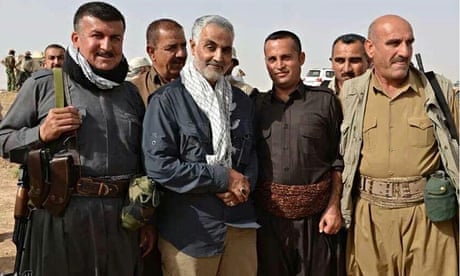
Qassem Suleimani: can this man bring about the downfall of Isis?
Read more
Soon afterwards it launched a bid to restore its tarnished domestic image by presenting Qassem Suleimani, the commander of the Quds force, as a national military hero who has defended the country from Sunni terror groups.
“When it comes to the current imploding situation in the Middle East, Khamenei is much more prone to listen to Jafari and Suleimani than to Rouhani or Zarif,” said Boroujerdi. “The guards’ institutional capability to exert influence on foreign, domestic and security policies is beyond doubt now.”
After years operating in the shadows, Suleimani – who was often portrayed as a kind of regional puppet-master of terror – has emerged into the limelight, his presence on the battlefield of Syria and Iraq breathlessly reported in state media. Hoardings in Tehran portray the IRGC as defenders of the nation.
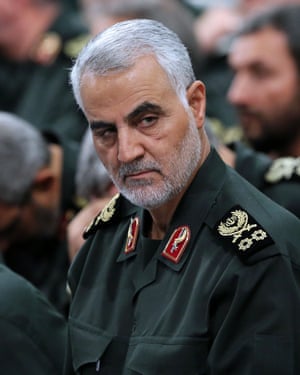
Guards commander Qassem Suleimani has been portrayed as a regional terror master. Photograph: AFP/Getty Images
One billboard that recently appeared in Tehran shows the firing of five missiles, in reference to the IRGC’s occasional and controversial testing of ballistic weapons, emblazoned with the words: “I am the Guardian of Iran.”
Like the Pakistani and Chinese militaries, the IRGC also has a large stake in the Iranian economy, both in legal and illegal enterprises. Guard commanders own large swaths of real estate in Tehran and are accused of involvement in lucrative cross-border smuggling operations.
“The IRGC’s domestic ascendancy is not unique, nor is its future trajectory immutable,” said a recent report from the US Rand thinktank. “As its history has shown, the IRGC is subject to the same worldly pitfalls and evolutionary mutations that affect other bureaucracies, and this will only intensify as the IRGC delves deeper into profit-making financial activities. Indeed, from this observation, there is benefit in comparing the IRGC’s past and future with the evolution of the Pakistani military and Chinese People’s Liberation Army.”
Mohsen Sazegara was a founding member of Khomeni’s sepah, but is now an exiled dissident and an outspoken critic of the organisation he helped establish. “We created a people’s army to defend the country and also help in emergencies, but it turned into a monster,” he told the Guardian.
“Its transformation during the Iran-Iraq war, then the creation of the Quds force, its involvement in financial activities and its role in suppressing reformists has turned it into a country inside a country, a government inside a government and an organisation that has no equivalent anywhere in the world. It’s like a river that is overflowing, covering everything.”[/size]
If everyone who reads our reporting, who likes it, helps fund it, our future would be much more secure[/size]
[size=16]Analysis 'We are on a tightrope': Trump poised to walk away from Iran nuclear deal[/size]
President unlikely to certify pact this week, triggering complex battle in Congress and Europe over ultimate fate of agreement
Read more
Ayatollah Khomenei, the charismatic cleric who soon became the country’s supreme leader, hesitated to call the members of the new force “guards”, fearing the word was too close to the French word widely used to refer to the ousted monarch’s elite personal force.
Instead he opted for sepah, a Persian word for soldiers with historical connotations, and the new force became known asthe sepah-e-pasdaran or “army of the guardians”.
Most foreign governments, however, refer to it as the Islamic revolutionary guard corps – a force that, 38 years later, has become a key player both inside Iran and across the region.
Reports that the US government is poised to designate the IRGC as a terrorist grouphave sparked jitters in Tehran, overshadowing Donald Trump’s expected plan to tear up the landmark nuclear deal.
Donald Trump’s demonisation of Iran is dishonest and dangerous
Michael Axworthy
Read more
The US accuses the IRGC of terror mainly because of its military support for Hezbollah and Hamas, organisations that the US and EU have both designated as terrorist groups. Trump has argued that Iran’s support for such groups violates the spirit of the nuclear deal.
Iranian officials say privately that Trump’s ability to unravel the nuclear deal is bound by the US Congress and the reaction of Washington’s allies in Europe. They warn, however, that a move against the IRGC would be a step too far and could even push the two countries towards open war.
Political leaders in Tehran are keen to show unity. A smiling IRGC commander, Mohammad Ali Jafari, was photographed earlier this week arm in arm with the foreign minister, Mohammad Javad Zarif, the architect of the nuclear deal.

The IRGC commander, Mohammad Ali Jafari, and Iran’s foreign minister, Mohammad Javad Zarif. Photograph: Handout/Reuters
Jafari has said that US military bases in the region would be open to attack if his forces were designated a terrorist group. Zarif’s ministry has said that Tehran’s reaction would be “firm, decisive and crushing”. Even the country’s moderate president, Hassan Rouhani, who five months ago made a rare public criticism of the IRGC during his run for a second term, issued his full-throated support for the force, saying that it “has a place in people’s heart”.
Farideh Farhi, an academic who monitors Iranian affairs closely, said that designating the IRGC as a terrorist group would be unprecedented.
“The IRGC is a integral part of Iran’s military defence and has constitutional standing as such. The designation of military officers of another country as terrorist will be a first and will open the US military to reciprocal action,” she said.
Particularly at risk, Farhi said, would be US special forces operating in the Middle East.
The IRGC initially operated as a local force across Iran, but it expanded quickly after Saddam Hussein invaded Iran in 1980 and Khomeini allowed it to have its own ground, navy and air forces.

Revolutionary guards in wargames near Qom, south of Tehran. Photograph: AFP/Getty Images
It played a key role in Iran’s defence, particularly in the Strait of Hormuz, where it used small speedboats to stop oil tankers used by Hussein and his allies.
“Before the war the IRGC militiamen were nothing more than bodyguards to the clerics. Their performance in the war gave them a seat at the proverbial power table,” said Mehrzad Boroujerdi, a professor of political science at Syracuse University in the US.
Khomeini, however, remained wary of its growing force, writing an explicit command for it to stay away from politics into his will.
After succeding Khomeini in 1989, Ayatollah Ali Khamenei introduced a new dimension to the IRGC’s operational capacity by creating the Quds force, which is in charge of its overseas operations and has worked closely with Hezbollah in Lebanon and Hamas in Palestine.
Tehran has never concealed its backing for Hamas and Hezbollah, which it sees as legitimate political parties that have won elections legally, said Ali Alizadeh, a London-based political analyst.
Such activities have infuriated the US and Iran’s regional rivals, but the IRGC’s operations in Lebanon, Bosnia and Iraq – and more recently its involvement in propping up Syria’s Bashar al-Assad – have hugely endeared them to Khamenei.
The US also alleges that Iran has been behind a series of bombings in Iraq that has led to the death of US military personnel, accusations that Iranian officials say are not substantiated. A string of senior IRGC and Quds force officers are already blacklisted and subject to US sanctions.
Despite the dying wishes of Khomeini, the IRGC did become politically active, most notoriously when its Basij militia helped to crush protests after the disputed 2009 elections.

Qassem Suleimani: can this man bring about the downfall of Isis?
Read more
Soon afterwards it launched a bid to restore its tarnished domestic image by presenting Qassem Suleimani, the commander of the Quds force, as a national military hero who has defended the country from Sunni terror groups.
“When it comes to the current imploding situation in the Middle East, Khamenei is much more prone to listen to Jafari and Suleimani than to Rouhani or Zarif,” said Boroujerdi. “The guards’ institutional capability to exert influence on foreign, domestic and security policies is beyond doubt now.”
After years operating in the shadows, Suleimani – who was often portrayed as a kind of regional puppet-master of terror – has emerged into the limelight, his presence on the battlefield of Syria and Iraq breathlessly reported in state media. Hoardings in Tehran portray the IRGC as defenders of the nation.

Guards commander Qassem Suleimani has been portrayed as a regional terror master. Photograph: AFP/Getty Images
One billboard that recently appeared in Tehran shows the firing of five missiles, in reference to the IRGC’s occasional and controversial testing of ballistic weapons, emblazoned with the words: “I am the Guardian of Iran.”
Like the Pakistani and Chinese militaries, the IRGC also has a large stake in the Iranian economy, both in legal and illegal enterprises. Guard commanders own large swaths of real estate in Tehran and are accused of involvement in lucrative cross-border smuggling operations.
“The IRGC’s domestic ascendancy is not unique, nor is its future trajectory immutable,” said a recent report from the US Rand thinktank. “As its history has shown, the IRGC is subject to the same worldly pitfalls and evolutionary mutations that affect other bureaucracies, and this will only intensify as the IRGC delves deeper into profit-making financial activities. Indeed, from this observation, there is benefit in comparing the IRGC’s past and future with the evolution of the Pakistani military and Chinese People’s Liberation Army.”
Mohsen Sazegara was a founding member of Khomeni’s sepah, but is now an exiled dissident and an outspoken critic of the organisation he helped establish. “We created a people’s army to defend the country and also help in emergencies, but it turned into a monster,” he told the Guardian.
“Its transformation during the Iran-Iraq war, then the creation of the Quds force, its involvement in financial activities and its role in suppressing reformists has turned it into a country inside a country, a government inside a government and an organisation that has no equivalent anywhere in the world. It’s like a river that is overflowing, covering everything.”[/size]
Since you’re here …
… we have a small favour to ask. More people are reading the Guardian than ever but advertising revenues across the media are falling fast. And unlike many news organisations, we haven’t put up a paywall – we want to keep our journalism as open as we can. So you can see why we need to ask for your help. The Guardian’s independent, investigative journalism takes a lot of time, money and hard work to produce. But we do it because we believe our perspective matters – because it might well be your perspective, too.[size]Thomasine F-R. wrote:I appreciate there not being a paywall: it is more democratic for the media to be available for all and not a commodity to be purchased by a few. I’m happy to make a contribution so others with less means still have access to information.
If everyone who reads our reporting, who likes it, helps fund it, our future would be much more secure[/size]

Guest- Guest
 Re: Iran - Perzija
Re: Iran - Perzija
Ne znam...Nešto se valja u ovoj godini...pismejker wrote:da..pocinje rastakeanje Irana..

red wolf-

Posts : 15947
2016-02-10
Lokacija: : Svemir
 Re: Iran - Perzija
Re: Iran - Perzija
detalje. tko su prosvjednici. šta se događa. ima dosta mrtvih. zašto se prosvjeduje. koje je stajalište Iranskog HDZa o svemu ovome? hoće li HDZ popustiti u nekim reformama? postoji li šansa da prosvjedi sruše HDZ sa vlasti u Iranu itdAlfaOmega wrote:Kaj te konkretno interesira, dečec?Pinochet wrote:Šta je sa neredima? di je onaj Iranski HDZovac, alphaomega da nam da neku informaciju?

Guest- Guest
 Re: Iran - Perzija
Re: Iran - Perzija
Ezeku moj..ja sinoc od 22.00,valjao Rujku u krevetu do 01.30..jedna velika tura bez pauze...lazem..jednom otisao samo da se osvjezim pod tus..mudri kazu..sto radis na prelazu godine,to ces raditi cijele iduce ..a ja hocu Rujku samo da ..valjam..red wolf wrote:Ne znam...Nešto se valja u ovoj godini...pismejker wrote:da..pocinje rastakeanje Irana..


Guest- Guest
Page 2 of 5 •  1, 2, 3, 4, 5
1, 2, 3, 4, 5 
Page 2 of 5
Permissions in this forum:
You cannot reply to topics in this forum
 Events
Events Latest images
Latest images
 by Eroo Sat 30 Dec - 21:29
by Eroo Sat 30 Dec - 21:29